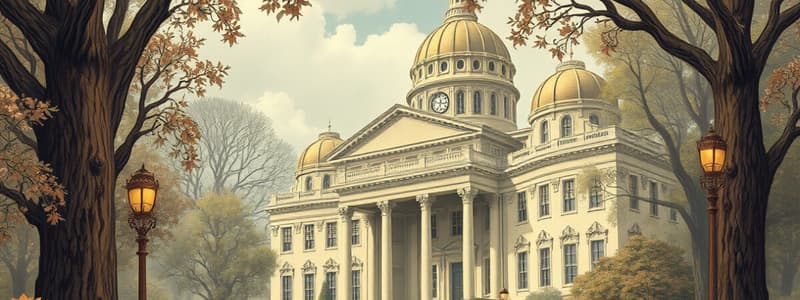Podcast
Questions and Answers
Who became George Washington's first secretary of state?
Who became George Washington's first secretary of state?
Thomas Jefferson
What was the purpose of the Louisiana Purchase?
What was the purpose of the Louisiana Purchase?
- To gain control of the Mississippi trade route (correct)
- To increase the national debt
- To establish French territory in America
- To expand the size of the United States (correct)
Who was the emperor of the French who approved Jefferson's purchase of French territory?
Who was the emperor of the French who approved Jefferson's purchase of French territory?
Napoleon Bonaparte
What did Thomas Jefferson favor regarding the interpretation of the Constitution?
What did Thomas Jefferson favor regarding the interpretation of the Constitution?
What major expedition was commissioned by Jefferson to explore the Louisiana Purchase region?
What major expedition was commissioned by Jefferson to explore the Louisiana Purchase region?
Who was the Federalist Supreme Court justice who established the principle of judicial review?
Who was the Federalist Supreme Court justice who established the principle of judicial review?
Judicial review allows the Supreme Court to declare laws unconstitutional.
Judicial review allows the Supreme Court to declare laws unconstitutional.
What was the outcome of the case Marbury vs Madison?
What was the outcome of the case Marbury vs Madison?
Who was remembered for his duel with Alexander Hamilton?
Who was remembered for his duel with Alexander Hamilton?
What did the Barbary Pirates do?
What did the Barbary Pirates do?
What incident in 1807 escalated tensions between the U.S. and Britain?
What incident in 1807 escalated tensions between the U.S. and Britain?
The Embargo Act of 1807 was successful in changing British and French policies.
The Embargo Act of 1807 was successful in changing British and French policies.
Who was the fourth President of the United States?
Who was the fourth President of the United States?
What did the Nonintercourse Act of 1809 achieve?
What did the Nonintercourse Act of 1809 achieve?
Who led the Native American confederacy against American expansion?
Who led the Native American confederacy against American expansion?
What was the main objective of the War Hawks in Congress?
What was the main objective of the War Hawks in Congress?
The _____ Convention met in 1814 to discuss grievances regarding the War of 1812.
The _____ Convention met in 1814 to discuss grievances regarding the War of 1812.
Which battle during the War of 1812 was fought after the peace treaty had already been signed?
Which battle during the War of 1812 was fought after the peace treaty had already been signed?
Who commanded the American fleet at Lake Champlain?
Who commanded the American fleet at Lake Champlain?
Flashcards are hidden until you start studying
Study Notes
Thomas Jefferson
- Third President of the United States (1801-1809), aligned with the Republican Party, advocated for limited federal government.
- First Secretary of State under George Washington; known for strict interpretation of the Constitution.
- Key achievement: Expanded U.S. territory through the Louisiana Purchase.
Louisiana Purchase
- Acquired in 1803 for $15 million from France, under Napoleon's rule.
- Doubled the size of the U.S. and secured control over the Mississippi trade route.
Napoleon Bonaparte
- Overthrew the French Directory in 1799 and became Emperor in 1804.
- Facilitated the Louisiana Purchase but later abdicated in 1814 after failing to defeat Great Britain.
Toussaint I'Ouverture
- Led a successful rebellion against French colonial rule in Santo Domingo, causing significant losses for France.
Strict Interpretation of the Constitution
- Thomas Jefferson's approach, emphasizing a literal interpretation that restricts federal powers to only what is explicitly stated.
- Contrasts with Alexander Hamilton's loose interpretation, allowing broader federal authority.
Lewis and Clark Expedition
- Conducted from 1804-1806 to explore the Louisiana Purchase territory.
- Provided valuable maps and scientific findings, promoting westward settlement.
John Marshall
- Federalist Supreme Court Chief Justice; established the principle of judicial review.
Judicial Review
- The authority of the Supreme Court to invalidate laws and actions deemed unconstitutional.
Marbury vs. Madison
- Landmark 1803 case asserting the Supreme Court's power of judicial review over Congressional acts.
Aaron Burr
- Third Vice President under Jefferson, known for his duel with Alexander Hamilton which led to Hamilton's death.
- Engaged in radical ventures that jeopardized national unity.
"Quids"
- Faction of Republicans critical of the War of 1812, arguing it violated their principles of limited government.
Barbary Pirates
- Groups from North Africa demanding tribute to protect U.S. ships; conflicts led to the Barbary Wars (1801-1805) after Jefferson halted payments.
Neutrality
- The policy of not supporting either side in a conflict, a position held by the U.S. during the early 1800s.
Impressment
- The forced recruitment of American sailors by the British navy, a key grievance leading to the War of 1812.
Chesapeake-Leopard Affair
- Incident in 1807 where a British ship attacked the USS Chesapeake, leading to heightened tensions and calls for war.
Embargo Act (1807)
- Jefferson's legislation halting trade with foreign nations to pressure Britain and France; backfired economically leading to its repeal.
James Madison
- Fourth President (1809-1817), pivotal during the War of 1812, previously instrumental in drafting the Constitution and Federalist Papers.
Nonintercourse Act (1809)
- Replaced the Embargo Act, allowing trade with all nations except Britain and France, yet failing to alleviate economic strain.
Macon's Bill No. 2 (1810)
- Restored trade with Britain and France, conditional upon respect for U.S. neutral rights, reflecting continued tension.
Tecumseh and the Prophet
- Leaders of a Native American confederacy aiming to resist American expansion into their territories.
William Henry Harrison
- Indiana Territory Governor who led U.S. forces at the Battle of Tippecanoe, defeating Tecumseh’s confederacy.
Battle of Tippecanoe
- Significant 1811 conflict that halted Native American resistance in the West and contributed to War of 1812 tensions.
War Hawks
- Young Republicans advocating for the War of 1812 to expand U.S. territory and assert national honor.
Henry Clay and John C. Calhoun
- Prominent War Hawks; Clay pushed for the Missouri Compromise, while Calhoun promoted Southern interests and slavery.
War of 1812
- Conflict driven by impressment, shipping interference, and British support for Native Americans; resulted in strengthened U.S. nationalism.
"Old Ironsides"
- Nickname for USS Constitution, symbolizing American naval resilience during the War of 1812 after defeating a British ship.
Battles of Lake Erie and Thames River
- Key U.S. victories that broke British power in the region; Thames concluded with Tecumseh's death, ending Native American alliances.
Treaty of Ghent (1814)
- Ended the War of 1812; restored pre-war boundaries and relations, despite communication delays affecting outcomes.
Hartford Convention (1814)
- Meeting of Federalist states opposing the War of 1812; proposed amendments and expressed grievances, leading to the party's decline.
Studying That Suits You
Use AI to generate personalized quizzes and flashcards to suit your learning preferences.




